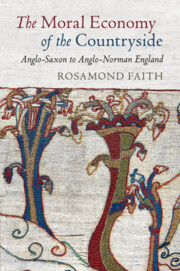Book contents
- Reviews
- The Moral Economy of the Countryside
- The Moral Economy of the Countryside
- Copyright page
- Contents
- Preface
- Abbreviations
- 1 Introduction: The Moral Economy
- Part I Rank
- Part II Reciprocity
- 5 Hospitality
- 6 Hearth, Household, and Farm
- Part III Reputation and Witness
- Part IV The Wolf Sniffs the Wind
- Part V The Aftermath of Conquest
- Part VI In the World of the Manor
- Appendix The Family Farm in Peasant Studies
- Bibliography
- Index
5 - Hospitality
from Part II - Reciprocity
Published online by Cambridge University Press: 25 October 2019
- Reviews
- The Moral Economy of the Countryside
- The Moral Economy of the Countryside
- Copyright page
- Contents
- Preface
- Abbreviations
- 1 Introduction: The Moral Economy
- Part I Rank
- Part II Reciprocity
- 5 Hospitality
- 6 Hearth, Household, and Farm
- Part III Reputation and Witness
- Part IV The Wolf Sniffs the Wind
- Part V The Aftermath of Conquest
- Part VI In the World of the Manor
- Appendix The Family Farm in Peasant Studies
- Bibliography
- Index
Summary
This chapter demonstrates how the idea of reciprocity: the idea of ‘what is owed in return’ permeated ordinary life. Wergeld was what a free man could honourably accept in return for an affront. Anglo-Saxon kings and their entourages were supported by a system of ‘uplifting’ resembling that of the Scottish clan chieftains, provided with food and drink and fodder collected from the farms of the districts they travelled through. The peasant families of the kingdom were expected to feed the king and his familia as if this remote group of high personages were literally their guests. It is suggested that the system may have originated in a period when the people of small regions were obliged to hand over produce to support a dominant figure with whom they felt a strong connection. The evidence suggests of later manorial custom suggests that hospitality continued to provide a language in which social relationships, even exploitative ones, might be expressed in a way which preserved people’s sense of worth.
- Type
- Chapter
- Information
- The Moral Economy of the CountrysideAnglo-Saxon to Anglo-Norman England, pp. 49 - 57Publisher: Cambridge University PressPrint publication year: 2019

